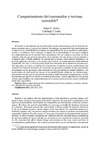Identificador persistente para citar o vincular este elemento:
https://accedacris.ulpgc.es/jspui/handle/10553/56328
| Campo DC | Valor | idioma |
|---|---|---|
| dc.contributor.author | Araña Padilla, Jorge | en_US |
| dc.contributor.author | León González, Carmelo Javier | en_US |
| dc.date.accessioned | 2019-08-07T20:03:18Z | - |
| dc.date.available | 2019-08-07T20:03:18Z | - |
| dc.date.issued | 2017 | en_US |
| dc.identifier.issn | 0210-2633 | en_US |
| dc.identifier.other | Dialnet | |
| dc.identifier.uri | https://accedacris.ulpgc.es/handle/10553/56328 | - |
| dc.description.abstract | El turismo es una industria que ha demostrado un alto potencial para generar bienestar humano en muchos países y regiones del planeta. Sin embargo, este potencial está condicionado por el objetivo de la sostenibilidad, que implica la compatibilización de los equilibrios ambientales, sociales y económicos. Para conseguir el objetivo de la sostenibilidad es necesario modificar los comportamientos de los turistas como consumidores. En este trabajo se presentan las ideas centrales sobre las que giran las decisiones de los turistas en el uso de los recursos naturales y el impacto sobre el medio ambiente. Se constata que el turismo, como industria hedonística, no presenta suficientes incentivos a los turistas para realizar un comportamiento ambientalmente responsable. Por ello, se necesita actuar desde una concepción de un modelo de decisión turística integrador, en el que se combinen los instrumentos económicos con los condicionantes del contexto en la toma de decisiones de los turistas. Se presentan resultados de dos experimentos relacionados con las decisiones sobre emisiones de CO2 que afectan al cambio climático y con las decisiones de reutilización de enseres en los establecimientos alojativos. La evidencia aportada permite concluir que los instrumentos de política ambiental pueden complementarse con los instrumentos que afecten al contexto en la toma de decisiones, como la información y las normas sociales, para modificar los comportamientos de los turistas hacia decisiones social y ambientalmente más responsables. | en_US |
| dc.description.abstract | Tourism is an industry that has demonstrated a high potential to generate human well-being in many countries and regions of the planet. However, this potential is conditioned by the objective of sustainability, which implies the compatibility of environmental, social and economic aspects. To achieve the goal of sustainability it is necessary to modify the behaviour of tourists as consumers. This paper presents the central ideas revolving around the decisions of tourists in the use of natural resources and the impact on the environment. It is noted that tourism, as a hedonistic industry, does not present enough i ncentives for tourists to perform environmentally responsible behaviour. For this reason, it is necessary to act from an integrated model of tourist decision, in which economic instruments are combined with the contextual factors conditioning the decision making of tourists. Results are presented on two experiments related to decisions in CO2 emissions that affect climate change and decisions on the reuse towels and linen in accommodation establishments. The evidence provided allows us to conclude that environmental policy instruments can be complemented with instruments that affect the context in decision making, such as information and social norms, in order to modify the behaviour of tourists towards socially and environmentally more responsible decisions. | en_US |
| dc.language | spa | en_US |
| dc.relation | Desarrollo de Métidos de Valoración Económica de Políticas Públicas, Aplicaciones Al Cambio Climático y A Los Bienes Ambientales en El Turismo | en_US |
| dc.relation.ispartof | Cuadernos económicos de ICE | en_US |
| dc.source | Cuadernos económicos de ICE [ISSN 0210-2633], n. 93, p. 45-68 | en_US |
| dc.subject | 531290 Economía sectorial: turismo | en_US |
| dc.subject.other | Comportamiento del consumidor | en_US |
| dc.subject.other | Brecha de las actitudes y acciones | en_US |
| dc.subject.other | Emociones | en_US |
| dc.subject.other | Información | en_US |
| dc.subject.other | Turismo sostenible | en_US |
| dc.title | Comportamiento del consumidor y turismo sostenible | en_US |
| dc.type | info:eu-repo/semantics/article | en_US |
| dc.type | Article | en_US |
| dc.identifier.doi | 10.32796/cice.201793 | en_US |
| dc.identifier.url | http://dialnet.unirioja.es/servlet/articulo?codigo=6385823 | - |
| dc.description.lastpage | 68 | - |
| dc.identifier.issue | 93 | - |
| dc.description.firstpage | 45 | - |
| dc.investigacion | Ciencias Sociales y Jurídicas | en_US |
| dc.type2 | Artículo | en_US |
| dc.description.notas | Clasificación JEL: L83, H23, Z32 Ejemplar dedicado a: Turismo sostenible: un debate abierto todavía a la discusión | en_US |
| dc.contributor.authordialnetid | 340663 | - |
| dc.contributor.authordialnetid | 301872 | - |
| dc.identifier.dialnet | 6385823ARTREV | - |
| dc.identifier.ulpgc | Sí | es |
| dc.description.dialnetimpact | 0,0 | |
| dc.description.dialnetq | Q3 | |
| dc.description.dialnetd | D6 | |
| item.fulltext | Con texto completo | - |
| item.grantfulltext | open | - |
| crisitem.project.principalinvestigator | León González, Carmelo Javier | - |
| crisitem.author.dept | Departamento de Análisis Económico Aplicado | - |
| crisitem.author.dept | GIR TIDES: Economía, medioambiente, sostenibilidad y turismo | - |
| crisitem.author.dept | IU de Turismo y Desarrollo Económico Sostenible | - |
| crisitem.author.dept | Departamento de Análisis Económico Aplicado | - |
| crisitem.author.orcid | 0000-0003-0878-9934 | - |
| crisitem.author.orcid | 0000-0001-9451-4093 | - |
| crisitem.author.parentorg | IU de Turismo y Desarrollo Económico Sostenible | - |
| crisitem.author.fullName | Araña Padilla, Jorge | - |
| crisitem.author.fullName | León González, Carmelo Javier | - |
| Colección: | Artículos | |
Visitas 1
1.636
actualizado el 23-nov-2024
Descargas
3.796
actualizado el 23-nov-2024
Google ScholarTM
Verifica
Altmetric
Comparte
Exporta metadatos
Los elementos en ULPGC accedaCRIS están protegidos por derechos de autor con todos los derechos reservados, a menos que se indique lo contrario.
